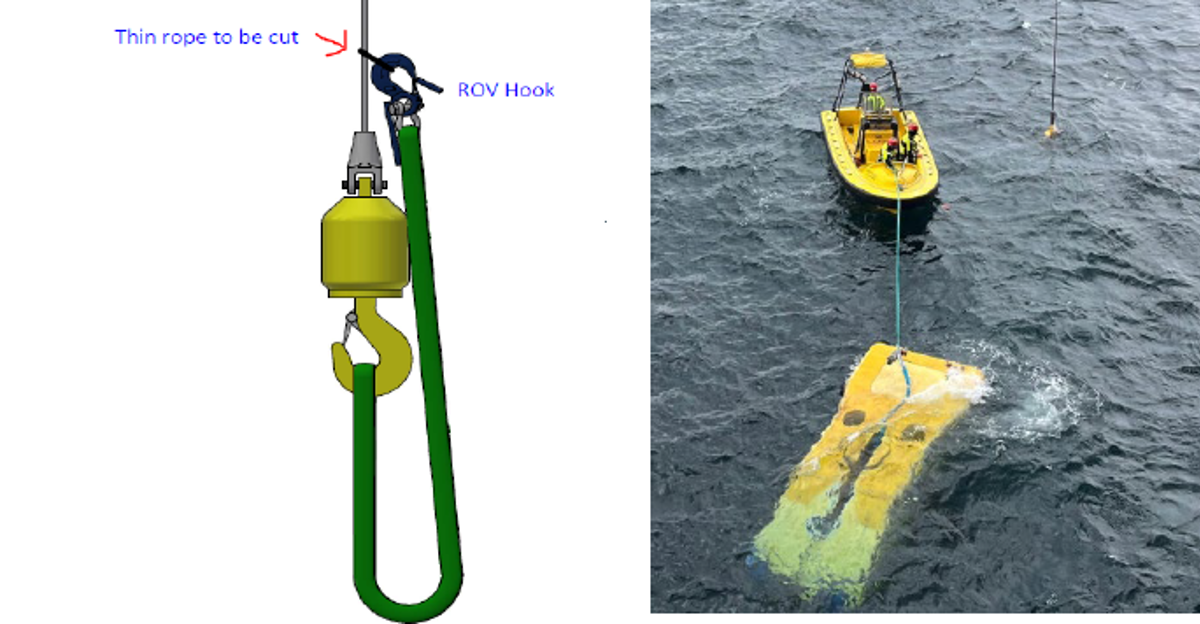LTI: Finger injury during emergency recovery of ROV
- Safety Flash
- Published on 27 November 2024
- Generated on 25 February 2026
- IMCA SF 23/24
- 2 minute read
Jump to:
A worker suffered a serious finger injury when their finger was caught between a crane wire and the recovery hook on an ROV.
What happened?
The incident occurred during an emergency recovery of the ROV. A small boat (an FRC) was used to facilitate connecting the ROV emergency rigging sling to the crane hook to allow recovery of the ROV to deck. Movement of the crane headache ball was controlled by having it slightly submerged and having the forerunner with ROV hook tied up with a rope to the crane wire.
The plan was for a second person to use the boathook to retrieve the ROV/crane hook, which would then be connected to the emergency rigging. When it was connected to the crane, the securing line from the ROV to the FRC would then be released.
The worker successfully retrieved the emergency rigging on the ROV and attached it to the FRC by a securing rope. Then the FRC moved away from the vessel and the crane operator on the vessel started paying out wire and manoeuvring the rigging towards the FRC. However, before retrieving the crane hook, the worker had to release the ROV hook attached to the crane wire with a thin rope, using a knife. As the worker did so, their finger was pinched, resulting in an amputation down to approximately the nail bed on the left ring finger.
Photo

What went right?
- A thorough toolbox talk, with all relevant personnel participating, had been held before the work took place
What went wrong?
- The step of releasing the ROV hook from the crane wire was not identified as a step, hence it was neither planned for nor risk assessed.
- Once the emergency recovery had started, the steps that needed to be taken were not sufficiently detailed in the plan or procedure.
- Fault finding and repair of latching mechanism on LARS ought to have been attempted prior to emergency recovery.
Actions taken
- Reviewed and updated Emergency Recovery procedure and risk assessment relating to it.
- Ensured that sufficient detailed planning, risk assessment and task evaluation take place particularly for emergency operations.
- Established regular training in emergency recovery scenarios using the FRC.
Related Safety Flashes
-
IMCA SF 03/23
18 January 2023
-
-
IMCA SF 16/13
17 October 2013
IMCA Safety Flashes summarise key safety matters and incidents, allowing lessons to be more easily learnt for the benefit of the entire offshore industry.
The effectiveness of the IMCA Safety Flash system depends on the industry sharing information and so avoiding repeat incidents. Incidents are classified according to IOGP's Life Saving Rules.
All information is anonymised or sanitised, as appropriate, and warnings for graphic content included where possible.
IMCA makes every effort to ensure both the accuracy and reliability of the information shared, but is not be liable for any guidance and/or recommendation and/or statement herein contained.
The information contained in this document does not fulfil or replace any individual's or Member's legal, regulatory or other duties or obligations in respect of their operations. Individuals and Members remain solely responsible for the safe, lawful and proper conduct of their operations.
Share your safety incidents with IMCA online. Sign-up to receive Safety Flashes straight to your email.